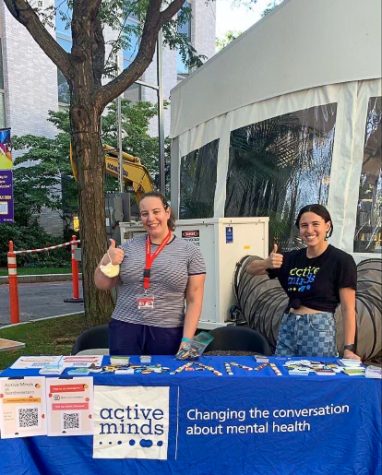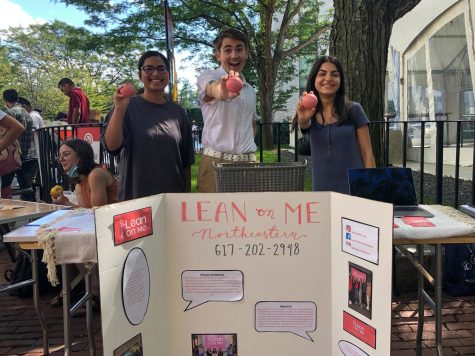Students support each other through mental health organizations, advocacy
January 6, 2022
Beyond university resources, groups from the Northeastern community are working to uplift the mental health of the student body.
Many student-run organizations, such as Active Minds and Lean on Me Northeastern, promote or offer services that the university does not, such as peer support and open spaces to air concerns and grievances.
Still students themselves, the leaders of these organizations understand the gravity of Northeastern’s mental health crisis while fighting for improvements within the university’s administration.

Active Minds is a nonprofit organization centering on mental health in young adults, with chapters in over 600 high schools and college campuses nationwide. The Northeastern chapter focuses on education around mental health, advocacy to improve mental health resources for students and self-care programming, according to its Vice President MK Moskowitz.
“We’re a community of people that care about mental health and a lot of us have lived experiences with mental illness,” the fourth-year human services and political science combined major said.
Throughout the semester, Moskowitz has helped organize numerous mental health programs for students. Active Minds held its first virtual grief meeting Dec. 27 as a way for students to speak openly and safely about the events of the semester.
“It’s been a really hard semester for a lot of people, and we wanted to hold some sort of space. [A grief meeting] is not something we’ve ever done before because none of us are clinicians, but we figured as a peer support event, we could just have a space where people could talk about what they’ve been going through the past couple of months,” Moskowitz said.
Active Minds also launched Break the Silence, an Instagram account where students can anonymously submit their experiences with NU’s mental health services, call for change or receive community support. Moskowitz said this program was inspired by NEU Speak Out, a similar Instagram account providing a platform for survivors of sexual assault. However, the need for Break the Silence also arose out of a request for evidence from the university.
“This past semester, I and a couple of other members of the board have been meeting with Northeastern admin about improving [mental health] resources. A lot of the pushback we were getting was like, ‘Oh, we’re just not hearing that it’s a problem, we need tangible evidence or first-person accounts of students running into issues with mental health services on campus,’” Moskowitz said.
Active Minds has planned to meet with UHCS this semester to discuss their ongoing list of demands to improve NU’s mental health resources. These demands range from bettering the mental health training of faculty and staff to pushing for Northeastern to adopt the International Accreditation of Counseling Services, or IACS, which would assure the hiring of diverse and proficient clinicians, among other improvements. Moskowitz said that while the administration is receptive to meetings, it is difficult to actually enact changes.
“They’re very, very nice people, but there’s definitely a lot of resistance to change. I understand to an extent, it’s a lot of nodding heads and saying, ‘that sounds great.’ And then there never seems to be any follow-through,” Moskowitz said. “There does seem to be a desire to do better, but there just seems to be so many institutional barriers in place where it gets really hard to get anything tangible done.”

Other organizations on campus, such as Lean on Me Northeastern, offer peer-to-peer counseling for students who need someone to talk to. The anonymous text hotline allows for those in the Northeastern community to discuss non-crisis issues with those who understand the pressures of being a student and without a time limit.
“We do think it’s a really unique resource because as Northeastern students we have stuff like co-op, we have stuff like N.U.in, which is a little bit difficult for someone older to empathize with those issues, so training supporters, training Northeastern students to listen to other students build[s] a better community and allows for more empathetic conversations to happen,” said Brigitte Cronin, a fourth-year chemistry and environmental science major and chapter coordinator of Lean on Me.
While Lean on Me is waiting to obtain designation as an official on-campus club, members are already working with the university to expand access to resources on campus. Cronin explained that UCHS in particular has been supportive of their efforts.
“[UHCS] have been really good advocates for us to get on campus because the people that work there are fantastic. … They recognize that there has been an issue with UHCS in the past and there still is just not enough access and staffing and counselors for such a big campus, they recognize that and they really want to get as many mental health resources out to students as they can,” Cronin said.
But in order to enact these changes within NU’s mental health services, students had to mobilize. Hurley, who was involved with the Active Minds survey, decided to create a petition in late December 2021 to share some of the statistics survey had found, as well as call on the administration to improve access to mental health care on campus.
I am a pretty big skeptic when it comes to the university and the administration, as I think a lot of people are. I went into that meeting thinking I would need to change people’s minds in the sense that I needed to make them realize that there’s a lot of sense of urgency behind this. But I didn’t really need to, they knew that. There was a lot of listening.
— Jackson Hurley
“I think the petition solidified that there’s a lot of people just really kind of just unsettled and unhappy with the way things are currently going,” Hurley said.
In the first weekend the online petition was published, it reached Hurley’s initial goal of 5,000 signatures. Many seem to come from Northeastern students, both based on the comments left and because it was only posted in Northeastern circles.The message is resounding: Students are ready for a change.
When the petition had around 600 signatures, Hurley got a call from Christine Civiletto, the executive director of UHCS. Hurley said she reached out because she had seen the petition and wanted to talk, a move that, to Hurley, proved a willingness to listen which he wasn’t expecting.
“I am a pretty big skeptic when it comes to the university and the administration, as I think a lot of people are. I went into that meeting thinking I would need to change people’s minds in the sense that I needed to make them realize that there’s a lot of sense of urgency behind this,” Hurley said. “But I didn’t really need to, they knew that. There was a lot of listening.”
Through that first phone call and the ensuing conversations Hurley said he wanted to share the student perspective that administrators may be missing.
Hurley said he has now discussed some changes and solutions with administrators and, though it is not clear which ones will be implemented or when, Hurley said he was hopeful coming out of those conversations.
